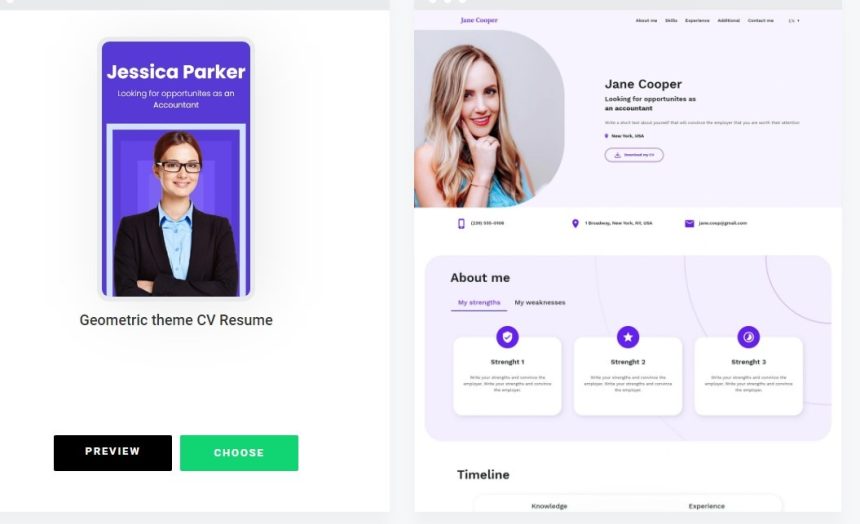In our current job market, staying ahead is about how fast you can adapt and grow.
Technology and global interconnectivity are transforming the skill set we need to succeed.
We explore the top skills that are becoming indispensable in securing a career in today’s competitive market.
There are two main categories to consider: digital literacy and tech skills and the so-called soft skills. Be sure to include them in your CV. If you are applying for jobs in Europe, you need to know the European CV format and add your skills accordingly.
Digital Literacy and Tech Skills
Technology governs much of our professional and personal lives. So, being tech-savvy is no longer a luxury but a necessity.
Soft Skills
These skills are anything but soft. Effective communication, adaptability, and emotional intelligence set apart good candidates from great ones.
Human-centric skills will increase in value.
As we delve deeper into each category, we’ll go over which skills are trending and why they matter.
Top Skills to Invest in Right Now
Technology and the workplace are both in constant transformation. Certain skills have become essential for success. Investing in these skills can enhance your employability and career prospects.
Basic Computer Skills
Professionals should be comfortable with word processing, spreadsheets, email communication, and basic data management. These are the basics for learning other digital skills.
Coding and Software Development
Coding has become a valuable skill across many sectors. Learning programming languages can open doors to many opportunities. Learning code is more accessible than ever. Plenty of online courses, some even free, are available online. Besides software development, you can find work in fields like data analysis, web development and finance.
Data Analysis and Management
The skill to analyze and interpret data is invaluable. Employers across many industries often look for people with skills in data visualization, database management and statistical analysis.
Digital Marketing and Social Media
As businesses grow online, digital marketing skills are essential for reaching customers and engaging with them. Some of these include SEO, content marketing, and social media management.
As we mentioned earlier, technical skills are vital in today’s job market. Yet, soft skills are just as relevant.
Two of the most critical soft skills in today’s job market are communication and adaptability.
Communication Skills
Verbal and written communication are valuable skills. The ability to communicate with a diverse range of people is a rare quality. Good communication skills are vital for every professional. Emails, team meetings and client presentations all need good communication.
Adaptability
Employers value the ability to adapt to change and learn new skills in a fast-paced work environment. Cultivate being open to new ideas, flexible in the face of changing circumstances, and resilient in the face of challenges.
Most Demanded Skills in Europe
Two areas that stand out in Europe are:
- data analysis and management
- multilingualism coupled with cultural awareness
Let’s find out why they are in high demand and how they can give professionals a competitive edge in the European job landscape.
Data Analysis and Management
Data is often described as the new oil, the ability to analyze and manage this data is a prized skill. As Europe moves toward data-driven decision-making in a variety of sectors, data skills have become more relevant.
Why It’s In Demand – Organizations want professionals who can collect, manage, and analyze large amounts of data to derive meaningful insights. Insights inform business strategies and policy decisions, which lead to innovative solutions.
Key Skills Involved – This includes proficiency in data analytics tools and software (like SQL, Python, R), understanding of data collection methods, data visualization, and the ability to interpret and communicate data findings effectively.
Multilingualism and Cultural Awareness
Europe’s diversity, combined with its position in the global economy, makes multilingualism and cultural awareness valuable assets.
The ability to speak multiple languages and navigate different cultural contexts is a significant asset in the European job market.
Why It’s In Demand – In a continent where many languages are spoken and business often crosses borders, being multilingual is an advantage. You will stand out in any industry, including business, tourism, technology, and other sectors.
Key Skills Involved – Proficiency in European languages such as German, French, Spanish, or Italian, besides English, is beneficial. An awareness of cultural differences—in business practices, communication styles, and social norms—is crucial too.
What HR Looks for in Candidates
When trying to find the right candidate, Human Resources (HR) look beyond the technical qualifications and work experience.
HR looks for a blend of interpersonal skills and personal attributes. A great candidate shows potential for long-term success and growth within the company.
Key areas HR often focuses on are teamwork and collaboration. Candidate should show commitment to continuous learning and self-improvement.
1. Teamwork and Collaboration
The ability to work as part of a team is a valued skill in every workplace. HR is keen on identifying who can collaborate, communicate, and contribute to a team dynamic.
Why It’s Important –
Teamwork and collaboration are the keys to success in projects and the functioning of the company. Candidates who show these skills can help existing teams grow and improve, create a more positive work environment, and contribute to collective success.
What HR Looks For: Evidence of teamwork, conflict resolution skills, the ability to listen and incorporate others’ ideas, and a willingness to resolve conflicts. During the interview, HR may ask about specific instances when you worked with a team, how you handled challenges within that group, and what role you played.
2. Continuous Learning and Self-Improvement
HR looks for candidates who show a proactive approach to personal and professional development.
Why It’s Important: A commitment to continuous learning indicates that a candidate is adaptable, resilient, and open to new challenges.
– What HR Looks For: A track record of pursuing extra training, certifications, or education. An interest in lifelong learning, a desire to develop new skills and an ability to apply them in practical situations.
During the recruitment process, be prepared to discuss how you keep up-to-date with developments in your field, how you have grown professionally and what approach you take to tackling new challenges.
Conclusion
The journey of skill development is ongoing, and it evolves with each step you take. The more skills you get, the better prepared you’ll be for the future of work.














